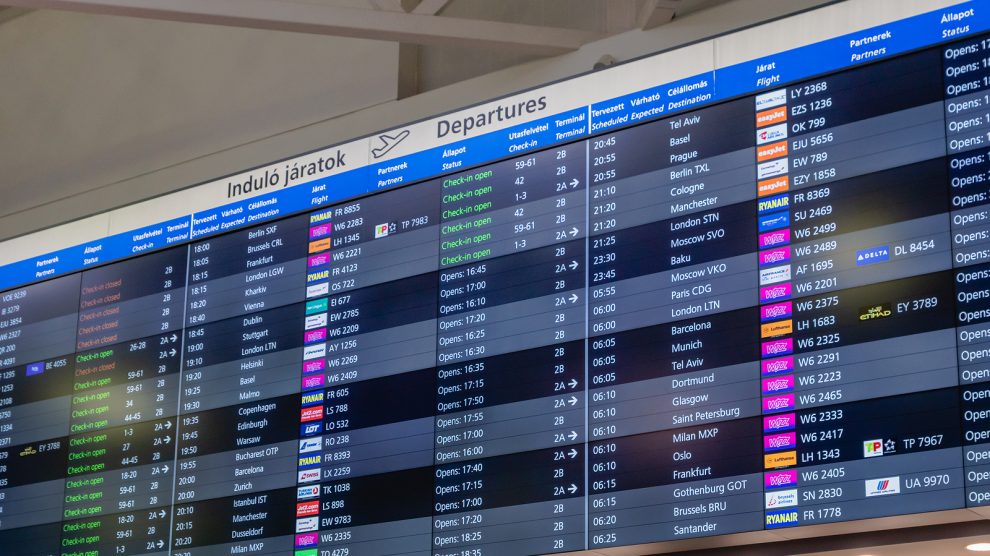Budapest’s Ferenc Liszt International Airport—a major regional flight hub—could return to government control after years of private ownership. It’s the latest target of the Hungarian government’s campaign of nationalisations.
The government of Hungarian prime minister Viktor Orbán has submitted a bid to take control of the capital’s airport—again. After a 2021 non-binding offer to buy the airport fell through, the government has maintained its intentions to acquire the regional flight hub and submitted a new bid on September 6.
The latest bid, valued at around four billion euros, would see a state-controlled investment company acquire a 51 per cent stake in the airport. The other 49 per cent would go to another, as-of-now unnamed, airport operator.
Emerging Europe’s latest research of air connections in emerging Europe, carried out in July, revealed that the airport serves 127 destinations across 41 countries: only Warsaw’s Chopin Airport serves more.
- Emerging Europe’s best-connected cities
- Why Budapest is (probably) Central Europe’s greatest city
- Economy in focus: Hungary
According to AviAlliance, a German-based airport management company owned by Canada’s Public Sector Pension Investment Board, currently operates and holds a 55.44 per cent stake in the Budapest airport, “The current owners have reviewed the offer in the interest of their funds and decided to enter into formal discussions, which are expected to last several months.”
Alongside AviAlliance, Malton, a subsidiary of the Singaporean state-owned investment fund, owns roughly 23 per cent of the airport, and Caisse de dépôt et placement du Québec, another Canadian pension fund, owns 21 per cent.
A bumpy landing
This latest bid comes after years of drama surrounding the Budapest airport’s fate. The airport was owned by the state until it was partially privatised in 2005—as air traffic had doubled over the prior seven years and major investments were needed to keep pace.
BAA, now Heathrow Airport Holdings—the operator of several British airports—took over the management of Budapest’s airport but sold its stake less than two years later to the German company HOCHTIEF AirPort—now AviAlliance—and three financial partners.
After major renovations and new construction, the Hungarian government sold its remaining minority stake to the majority owners in 2011—a year after Orbán returned to power—and HOCHTIEF fully took over its operations.
In February 2012, Hungary’s national airline, Malév, went bankrupt, forcing the airport operator to suspend numerous developments and implement drastic cost-cutting measures, including closing the airport’s Terminal 1.
However, Ryanair and WizzAir—both budget airlines, the latter of which is headquartered in Budapest—expanded their flights through Budapest, and the airport ended 2012 with only a 4.7 per cent reduction in traffic.
Indeed, despite Malév’s collapse, the expansion of budget flights led massive increases in traffic through the airport, while new construction has also increased cargo capacity. Feeling seller’s remorse, the government decided to try buying back control in May 2021.
“It has since become quite evident that the sale was against Hungary’s strategic interests and (the sale) also made investments to enhance the quality of service for passengers exceedingly difficult,” the government said in a statement at the time.
Amid domestic budget concerns, high inflation, uncertainty in international financial markets, and approaching parliamentary elections the next year, Orbán announced in December 2021 that the airport’s reacquisition would be delayed.
A broader campaign of nationalisation
The reacquisition has nevertheless remained on the government’s agenda, and this May, Orbán stated he would welcome Qatari investors interested in the airport as strategic partners.
Bloomberg has reported that the government sold 1.75 billion euros in Eurobonds on September 5 to finance what it said was an increased funding need and plans to prefinance debt maturing in 2024, but it had also floated using foreign-currency bonds to finance the purchase. While the government introduced a price cap on costs in 2005 during the privatisation process, it is unclear whether this will survive the reacquisition—potentially leading airfare prices to increase.
The airport’s purchase would only be the latest in a series of nationalisations pursued by Orbán over the last decade. Although countries in emerging Europe have generally increased privatisations over time, Hungary has bucked the trend by taking over operations of metal recycling, energy and utilities, some banking, and telecommunications.
After Heidelberg Materials, a German company selling cement in Hungary since the 1990s, rejected a takeover offer from the Orbán government in 2022, a 90 per cent mining tax was imposed on it and the state has worked to set prices for cement products. The Hungarian subsidiary of Heidelberg Materials is now making a loss.
The Hungarian government has justified its nationalisations by arguing energy, utilities, and other sectors should not be for-profit.
If its reacquisition of Budapest’s airport is successful, it would be one of the only times a country in the region has recently renationalised a profitable transportation hub, but would be only the latest instance of Hungarian heterodoxy.
Unlike many news and information platforms, Emerging Europe is free to read, and always will be. There is no paywall here. We are independent, not affiliated with nor representing any political party or business organisation. We want the very best for emerging Europe, nothing more, nothing less. Your support will help us continue to spread the word about this amazing region.
You can contribute here. Thank you.



Add Comment